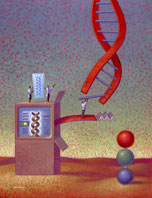Introduction
Biotechnology is a field of applied biology that involves the use of living organisms and bioprocesses in engineering, technology, medicine and other fields requiring bioproducts. The concept encompasses a wide range of procedures for modifying living organisms according to human purposes.
Genetic engineering is the direct human manipulation of an organism’s genome using modern DNA technology. This process involves the introduction of foreign DNA into the organism of interest. Organisms created in this way are known as genetically modified organisms (GMOs).
Synthetic biology is a new wave of genetic engineering which seeks bring the field more inline with traditional engineering practices such as standardization and abstraction. Utilizing the technological explosions of the computer and genetic revolutions – synthetic biology is turning science fiction into reality.
As a whole these fields show impressive promise, but they also bring with them risk. Fears of bioterrorism or accidental catastrophes have been raised, as have concerns about ethical considerations in these works. Scientists and communities are working together to help regulate and control these technologies in ways which make them safer, without stifling their potent.
Learn More
The following pages present a very basic overview of the general concepts behind synthetic biology and genetic engineering. The rest of this website also contains a multitude of information on these subjects – to find more introductions check out posts tagged as “Beginner“.
This website is only one of many educational sites on these topics. Check out the resources page to find lots of other useful sites. I’d also like to bring your attention to this great set of teachers notes [PDF] by RIAus on Synthetic Biology aimed at students in grades 7-9, but which are a great introduction for people of all ages. If you are looking for more in-depth education in these areas, many universities offer courses or even degrees in them. Basic biology education (particularly in genetics) also goes a long way towards understanding these areas.
Is Synthetic Biology Overhyped?
Before jumping into some of the more exciting aspects of these technologies, I would like to first address the concern of hype. Synthetic biology has become a “buzz word” and some critics have claimed that the promise of this technology is overstated.
Any response to this question will be partially opinion, but there is certainly evidence and precedent we can look at. Very few people doubt the usefulness of synthetic biology, it is clear that at the very least it has potential to create useful and exciting products. Biology is also an undoubtedly complicated beast, one which we are only just beginning to properly understand. Yet, even with such limited understanding we have already made amazing things – and our understanding is only going to get better with time.
But will these biological technologies be revolutionary? Will synthetic biology change the world the way the computer did? Some say it will, others are doubtful – but to a large extent it doesn’t matter! What should matter is that we are inspired to give it our all and to try and push synthetic biology to its limit. Synthetic biology is inspiring, work already published is inspiring, and we should be excited about the future – only time will tell what it holds for us.
We are in the dawn of this technology, it is a great time to learn and get involved with it. We are not unlike the pioneers of early computers some 50 years before us and we have a responsibility (and opportunity) to teach others about this technology and get the communities of the world involved at an early stage.
Synthetic biology is hyped, sometimes too far, but at its worst these wild speculations represent merely our dreams and desires – our images of a world to strive for. But it is also by no means all hype, synthetic biology is already here – and we have great examples of the amazing things it has already done. So doubt if you want, but don’t forget to dream as well.
| Next Up – Genetic Engineering |
















